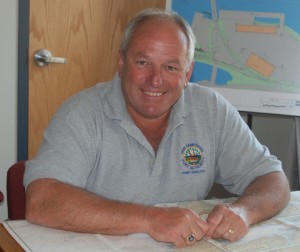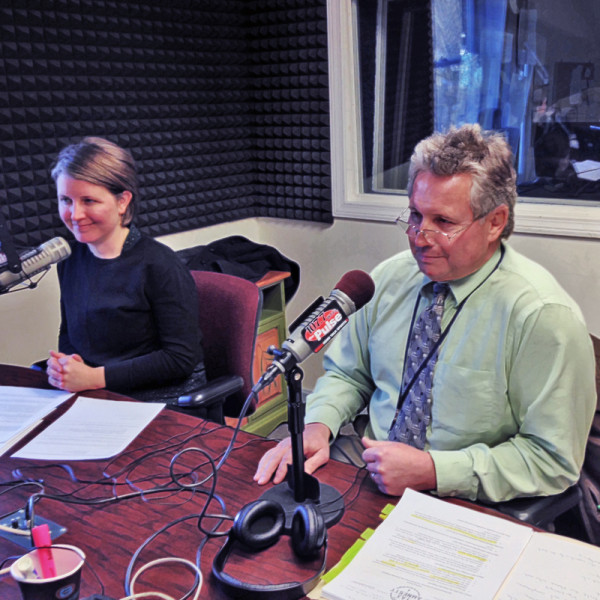Archive for January, 2016
Friday, January 29th, 2016
Portsmouth, home to a deep water port, has centuries-long experience in dealing with ships and commerce, making it one of the oldest working ports in the country. The Port of New Hampshire is tremendous asset for many industries, including Granite State companies sending their products to markets around the world.
Today, we’re meeting Geno Marconi, director of the New Hampshire Division of Ports and Harbors.
 Geno Marconi ~ NH Division of Ports and Harbors 1. The Port of New Hampshire is the Granite State’s ‘Gateway to the World.’ How much cargo flows through the port annually?
The port as a whole handles about four million tons of cargo annually. This includes the seven terminals on the river that have 16 businesses utilizing them. According to The Economic Impact of the Piscataqua River and the Ports of Portsmouth and Newington study, 987 jobs paying $90.2 million in wages and benefits were directly employed by those 16 businesses (not including Portsmouth Naval Shipyard – ed.). Regionally, port-related activities include 2,357 jobs (2,078 in NH and 280 in Maine) paying $156 million in income, with $274.5 million in value added. In addition, $25 million in state and local taxes are generated as a result of these activities.
2. Part of the mission of the Division of Ports and Harbors is to stimulate the economy and create jobs. How does it do that on a day-to-day basis?
The Port Authority is involved in several different aspects:
- We operate the state-owned Market Street Marine Terminal, the state’s only public access general cargo terminal, and we provide the opportunity to businesses that want to move merchandise in and out of the area. The terminal also supports activities at all the other terminals, including the Port’s Naval Shipyard. Materials and equipment for those other facilities are often transloaded from here;
- We operate the commercial fish piers in Portsmouth, Rye and Hampton, providing a platform to the fishing industry. Additionally there are charter fishing, whale watch, and tour vessels that operate from our facilities in Portsmouth, Rye and Hampton;
- We oversee the dredging of the harbors and channels in order to keep commerce moving. We are now partnered with the Army Corps of Engineers in a $23 million project to expand the uppermost turning basin of the Piscataqua River.
3. What are the advantages of using the Port of New Hampshire for freight shipments?
It all depends on the cargo and tee destination. Each cargo opportunity receives personalized attention depending on the needs. For example: An oversized piece of equipment that may be on a ship bound for NY with a final destination in Bedford, NH, would have great difficulty getting over-the-road permits through some states. Many times we have put these types of cargo onto a barge and brought them here at the state pier.
4. NH also has five Foreign Trade Zone sites and two subzones, and the DPH serves as the FTZ grantee. How do these FTZs benefit the New Hampshire economy?
Simple answer: The companies would go someplace else if we didn’t have them. (An FTZ offers tariff and tax relief to New Hampshire exporters, which lowers their costs and increases employment, capital investment and revenue opportunities. FTZs are supervised by U.S. Customs and Border Protection, a division of Homeland Security. -ed.).
5. Is there anything new or exciting happening with the port and its operations, or projects happening in the coming months?
The exciting projects are the Sarah Long Bridge (to straighten the navigation channel, which will allow larger ships to access the port; and to increase the vertical clearance, allowing taller ships to pass and reduce bridge openings) and the Turning Basin, also to allow larger ships to access the port, both long overdue navigation safety and improvement projects. Once these are done, we are looking at attracting new cargo here at the Port Terminal.
Tags: 5 Questions, Division of Ports and Harbors, Geno Marconi, Gino Marconi, Port of New Hampshire
Posted in NH Business Matters | Comments Off on 5 Questions with Geno Marconi, Port of New Hampshire
Friday, January 22nd, 2016
![GovernmentContracting logo_rgb[1]](https://blog.nheconomy.com/wp-content/uploads/2016/01/GovernmentContracting-logo_rgb1-300x120.jpg) New Name, Same Agency The name was a mouthful – New Hampshire Procurement Technical Assistance Program.
You may have known it in its abbreviated form: NH PTAP. And if you didn’t know what ‘procurement technical assistance’ meant and were afraid to ask, fear no more.
NH PTAP has always been about government contracting and helping New Hampshire businesses navigate the process to bring Uncle Sam on board as a customer. The name, though, sort of said that, but it didn’t.
So, as of Jan. 1., we’ve changed our name to the NH Government Contracting Assistance Center. The new name gets straight to the work of our agency.
Only the name has changed. Our services are still free to New Hampshire businesses and the same award winning staff is ready to help you bid on – and win – contracts from the federal government.
We’ll call ourselves ‘government contracting’ for short — no abbreviation.
The alphabet is happy to get some of its letters back and we’re happy that our new name leaves no one guessing what we do.
Dave Pease
Program Manager
NH Government Contract Assistance Center
Tags: Dave Pease, federal contracting, government contracting
Posted in NH Business Matters | Comments Off on Government Contracting is the New Name for NH PTAP
Friday, January 22nd, 2016
Now in its 25th year, the New Hampshire Innovation Research Center is the bridge connecting collaborations between industry and the University of New Hampshire. Since it was created by an act of the Legislature in 1991, the NHIRC has awarded more than $6 million in state funds to support research projects and has been responsible for the creation or retention of 650 jobs. Marc Sedam, Associate Vice Provost for Innovation and New Ventures, talks about center.
 Marc Sedam ~ NHIRC 1. Part of the mission of the New Hampshire Innovation Research Center is to attract new business to New Hampshire. What does that look like on a day-to-day basis?
The NHIRC is funded directly by the state to promote university-industry collaborations based on industry need. We have 1-2 funding cycles each year.
2. Can you share some of the latest product and process innovations to come out of an NHIRC collaboration?
The IRC recently funded research on the interoperability of medical devices and the ‘big data’ of medicine, as well as research aimed at improving the electrical conductivity of carbon nanotube wire, to the point where it can replace copper for power applications.
3. Companies can get assistance with their proposals to NHIRC from university researchers. How does the process work?
Companies applying to the NHIRC need to have a partner that is a New Hampshire college or university. So the assistance piece is usually a research strength that the University has or can help with, that extends the capacity of the company’s efforts. Companies either come to the program with a university/college partner already identified, or can come to us needing a partner and we can do matchmaking.
4. From a personal perspective, what drives you in your work? What things about NHIRC make you excited every day?
I always get excited about universities and industry working together. When the RFPs come out, I enjoy seeing what New Hampshire businesses are up to and where their research might take them in the future. University-industry collaborations drive economic strategy in most areas of the US and it would be great to see more of that in New Hampshire.
5. What does NHIRC have on the horizon that’s particularly exciting or, well, innovative?
We’ve begun providing Small Business Innovation Research and Small Business Technology Transfer education and training that has been well received. New Hampshire has under performed relative to the states around us in acquiring SBIR/STTR funding in the past, so we’re glad to see there’s real interest in this work.
Tags: 5 Questions, Marc Sedam, NH Innovation Research Center
Posted in NH Business Matters | Comments Off on 5 Questions with Marc Sedam, New Hampshire Innovation Research Center
Thursday, January 21st, 2016
 Carmen Lorentz and Peter Colbath New Hampshire Business Matters hits the airwaves at 3 pm (-ish) every third Wednesday of the month on WTPL-FM 107.7. We’re part of Ken Cail’s Cail & Co. afternoon show.
Each month, Division of Economic Development Director Carmen Lorentz explores news and trends of interest to New Hampshire businesses.
Yesterday, with guest Peter Colbath of the Department of Revenue Administration, the topic was taxes. (Who’s not interested in tax news, especially when two business taxes are going down?)
Of particular interest to businesses is the looming deadline (Feb. 15) for tax amnesty. We have the details here and it’s worth a listen, brought to you in a convenient podcast format.
Lorna Colquhoun
Communications Director
Division of Economic Development
Tags: business taxes, Carmen Lorentz, Department of Revenue Administration, NH taxes, tax amnesty
Posted in NH Business Matters | Comments Off on Tax News and Tax Amnesty: News NH Businesses Can Use Today
Friday, January 15th, 2016
We’re taking our 5 Questions to the North Country this morning and chatting with Pamela Laflamme, community development director for the City of Berlin. She is an ideal fit for that position – this is where she grew up and where she returned. Over the past 15 years, with the demise of its paper industry, Berlin has been evolving, creating new opportunities for small businesses attracted to the beauty of the area and the quality of life.
 Pamela Laflamme ~ Community Development Director, Berlin 1. Can you explain a bit about what BIDPA does for Berlin and surrounding communities, and your role within BIDPA?
The Berlin Industrial Development and Park Authority, by state statute, was created under RSA 162-G along with the City of Keene. BIDPA works with local businesses to grow and retain jobs. It also works with developers looking to locate or relocate to the community.
BIDPA is group of volunteers that serve the city as an enterprise fund of the municipality. I provide staff assistance to the board, along with our city manager, Jim Wheeler. BIDPA works on projects alone as well as with other partners throughout the region and the state.
2. You’ve been the community development director in Berlin for 15 years. What is it about the area that makes it particularly attractive for businesses?
The city works hard with businesses to help them succeed. Berlin has a long history with manufacturing and while that sector has seen a lot of decline over the last decade, smaller businesses have come to the community to take advantage of that workforce. We live in a beautiful part of the state, surrounded by numerous recreational opportunities. Being able to finish your work day and get out to do some fishing, skiing, hiking or ATVing within a few miles of your workplace is very appealing to those who enjoy the outdoors. Hard workers, a dedicated group of city councilors, BIDPA members and the accessibility of the outdoors are just a few reasons to live, work and play in our area.
3. Berlin was named the 2015 City on the Rise by New Hampshire Magazine. Can you share highlights of business projects contributing to Berlin’s improvement?
The City on the Rise recognition was a welcome surprise to the community. The Androscoggin Valley Chamber of Commerce and the Main Street program are extremely active, with hard working volunteers who create several highly successful events every year, including the very popular RiverFire, Jericho ATV Festival and Brewtopia.
The Women’s Rural Entrepreneurial Network opened a second location this summer in downtown, bringing a lot of activity to Berlin. We have been working with developers to reuse old school buildings, and they are providing quality housing options to seniors and residents of low and moderate income, cleaning up our neighborhoods. The city has been working diligently over the last decade to rebuild the local economy and provide more job diversity. The City on the Rise award tells us that other people are noticing our hard work.
4. Putting yourself in the shoes of a business considering moving or expanding to Berlin from out of state, what are the most important things it should plan for to make the transition easy and how does BIDPA help?
BIDPA works hard with developers to make their transition as painless as possible. We recently helped a company from Massachusetts establish a second location in our industrial park. Our chairman, Mike Caron, a local businessman himself, worked closely with the company’s owner to help him connect with the programs and organizations that could assist in setting up the new location. We connected them with the local office of Employment Security to help screen applicants, brought them to the regional economic development organizations to assist with funding, and we are happy to report our support has paid off with a successful Community Development Block Grant project with Coos Economic Development Corp. and several new jobs that will put displaced manufacturing employees back to work.
Chairman Caron is dogged in his work to make sure those who want to locate here are able to do so with as little hassle as possible.
5. What’s coming up for BIDPA?
BIDPA has several projects in the works that are in the early development stages, so it is too soon to discuss them publicly. The board is optimistic and they are looking forward to a productive 2016; check back with us next year!
Tags: 5 Questions, Berlin Industrial Development and Park Authority, City of Berlin, Pamela Laflamme
Posted in NH Business Matters | Comments Off on 5 Questions with Pamela Laflamme, Community Development Director, City of Berlin
Friday, January 8th, 2016
We talk about international trade a lot on this blog, letting our businesses throughout the state know about the opportunities to be had overseas. Global markets likely need products and services made right here in New Hampshire – they just need to know where to find them. Our Office of International Trade works diligently to introduce businesses to these markets through its many partnerships. James Demers answers this week’s 5 Questions about one of those organizations.
 James Demers 1. Can you explain a bit about what the International Trade Advisory Committee does for the state and your role within it?
The International Trade Advisory Committee is a committee authorized by law with the primary mission of assisting the Department of Resources and Economic Development and the state’s Office of International Commerce in promoting and increasing international trade for New Hampshire businesses.
Legislative leaders have recognized that opportunities exist for New Hampshire businesses to participate in the world economy and they have actually tasked DRED with developing resources to assist companies in this area. So, ITAC is one element that brings a group together with experience and interest in international trade to assist with these goals.
2. You’ve been involved in the field of international trade for many years, even serving on the board of directors of the Overseas Private Investment Corp. What can you tell us about the opportunities for New Hampshire in the export market?
It is an honor to serve as chairman of New Hampshire’s International Trade Advisory Committee as well as having been appointed by President Obama to serve on the board of the Overseas Private Investment Corp., which is the federal government’s development financial institution.
Many people think that international trade and business opportunities in developing countries are solely for very large corporations, but one of the things I have learned from both organizations is there are tremendous international opportunities for small businesses too.
The key point is businesses need to think a bit outside of the box. If they have a product or service that works well here in New Hampshire or in the United States, it is likely there are other places that could use it too. As a matter of fact, in many cases there are foreign markets that lag the United States and need many products we take for granted here.
Companies, big and small, that are looking to grow should think about potential opportunities in other countries. And that is where the state’s Office of International Commerce can help. Small businesses rarely have the expertise to figure out how to proceed in getting into another country, or even determining where opportunities might exist. People need to recognize the state has a division that can assist them.
3. Are there industries in New Hampshire that may not be thought of as exporters, but could discover tremendous opportunity for their businesses if they pursued an export strategy?
Absolutely. The one that comes to mind is in the healthcare delivery system. During Governor Hassan’s trade mission to Turkey, I met with a businessman in Istanbul who owns a cancer treatment hospital in Turkey. He told me that they have several missing elements of cancer healthcare, most notably hospice and palliative care facilities. That made me realize there is a significant need for hospice services that could be delivered by American entities that know how to deliver this aspect of service.
4. What are the biggest challenges to New Hampshire exporters right now, and what is ITAC doing to help solve them?
One of the challenges is actually finding foreign business markets and making contacts in countries that might help develop export opportunities. That is where the state’s Office of International Commerce can help. Businesses should not hesitate reaching out to the OIC for assistance.
5. What’s coming up for ITAC that’s new and exciting?
Earlier this year, the legislature amended the ITAC law, adding additional members who will bring more expertise in the area of international trade. We have always had support from federal agencies like the Commerce Department and Small Business Administration, but the law change also adds representatives from the state’s four-member congressional delegation, which hopefully will help coordinate even stronger collaboration between state and federal trade agencies. This should help bring even more resources and information for New Hampshire businesses looking to enter foreign markets.
Tags: 5 Questions, exporting, James Demers, Office of International Commerce
Posted in NH Business Matters | Comments Off on 5 Questions with James Demers, New Hampshire International Trade Advisory Committee
Monday, January 4th, 2016
Happy New Year from NH Economy! While we’re waiting for 2016 to wind up, there a few things to share with you from 2015.
 NH Economic Review 2015 The first one is the New Hampshire Economic Review 2015, which is 28 pages of facts and figures about our state and information about some of the business expansions/relocations here in the past year; trade figures and business trends. It’s a short look at what great things happening here in the Granite State.
Director Carmen Lorentz and her staff spent several months last year crafting a thoughtful strategic plan for the Division of Economic Development (that’s us!). For the first time in memory, the agency now has a road map to follow as we work to make New Hampshire the best place to do grow a business and prosper.
Is this the year your business will reach heights in New Hampshire? We have plenty of information available to decide for yourself at our website.
Let us know how we can help you reach your goals for 2016.
Lorna Colquhoun
Communications Director
Division of Economic Development
Tags: 2016; 2015 Economic Review, nheconomy.com, strategic plan
Posted in NH Business Matters | Comments Off on Oh, Hey, 2016! We’re Looking Forward to You!
|











![GovernmentContracting logo_rgb[1]](https://blog.nheconomy.com/wp-content/uploads/2016/01/GovernmentContracting-logo_rgb1-300x120.jpg)




